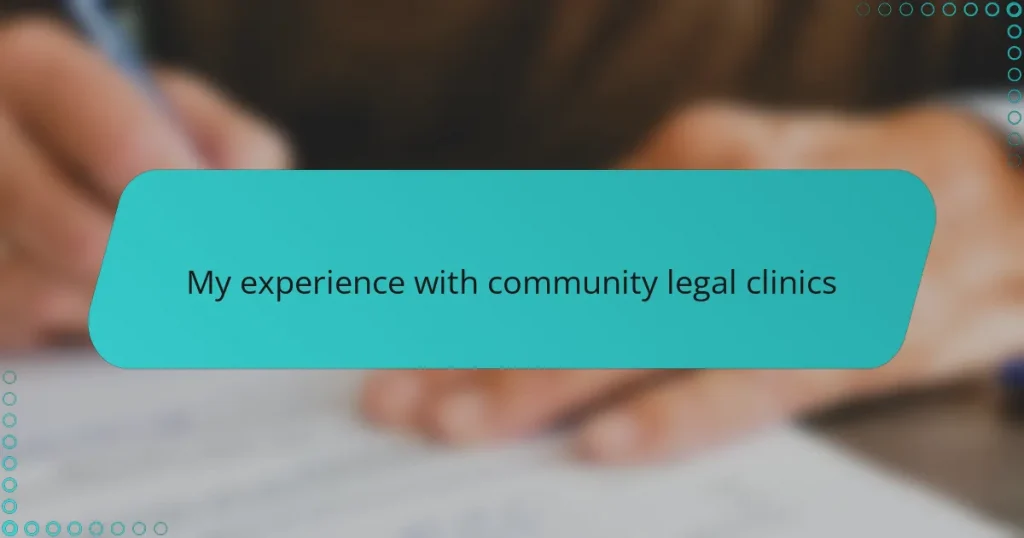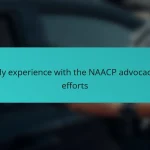Key takeaways
- Community legal clinics provide affordable, accessible legal services, empowering individuals by breaking down complex legal issues.
- These clinics offer personalized support and advocacy, ensuring clients feel heard and respected throughout their legal journeys.
- While they face challenges like wait times and complex legal matters, the commitment of advocates helps clients navigate the system with confidence.
- Overall, community legal clinics foster a sense of empowerment by educating clients about their rights and helping them advocate for themselves.
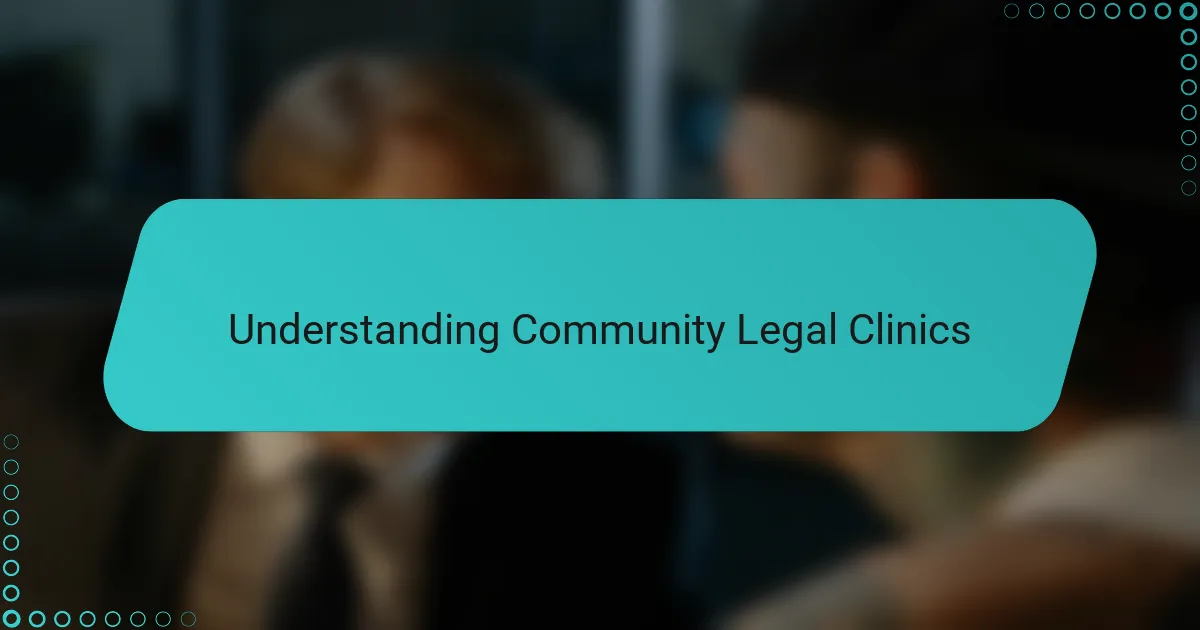
Understanding Community Legal Clinics
Community legal clinics are often the unsung heroes in the world of legal advocacy. They provide free or low-cost legal services to individuals who might otherwise be shut out of the justice system. When I first visited a community legal clinic, I was struck by the genuine care and attention they offered—it wasn’t just about legal advice; it felt like someone was truly on my side.
Have you ever felt overwhelmed by legal jargon or unsure where to turn with a legal problem? That’s exactly where these clinics step in. They break down complex legal issues into understandable terms, making the law accessible and less intimidating. I remember feeling a mix of relief and confidence after my initial consultation, realizing I wasn’t alone in navigating my case.
What’s remarkable about community legal clinics is their rootedness in the local community. They don’t just treat cases—they listen to stories, understand struggles, and advocate for people in a way large firms often can’t. In my experience, this personal connection made all the difference, transforming a daunting challenge into a manageable journey.
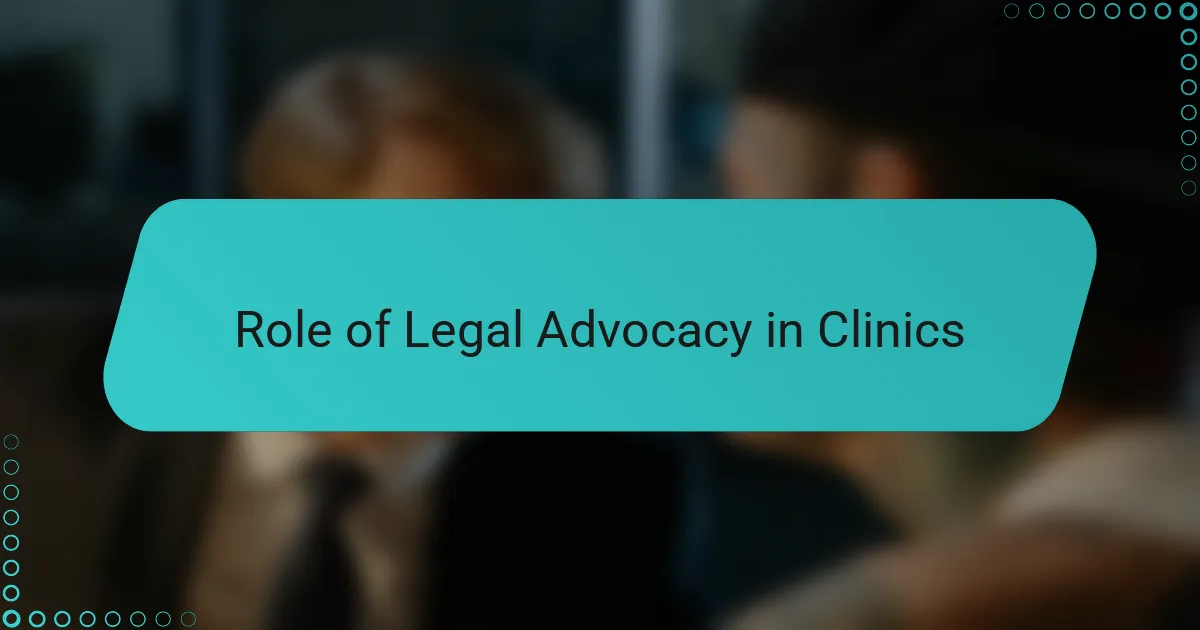
Role of Legal Advocacy in Clinics
Legal advocacy in community legal clinics goes beyond just offering advice—it’s about standing shoulder to shoulder with clients during their toughest moments. I found that advocates don’t just explain the law; they fight to ensure your voice is heard and your rights respected. Have you ever felt like the legal system was too big or too cold? That’s exactly what advocacy in these clinics helps to break down.
When I worked with an advocate at a clinic, I noticed how they tailored their approach to fit my unique situation. This wasn’t a one-size-fits-all service; it was personalized support that made me feel truly seen. Their advocacy wasn’t just professional—it was deeply human, which I believe is the clinic’s real power.
What struck me most was how advocates manage to balance empathy with determination. They listen carefully, provide honest guidance, and then actively push for solutions. Seeing that level of commitment reassured me that legal advocacy in community clinics is about more than law—it’s about justice on a very personal level.
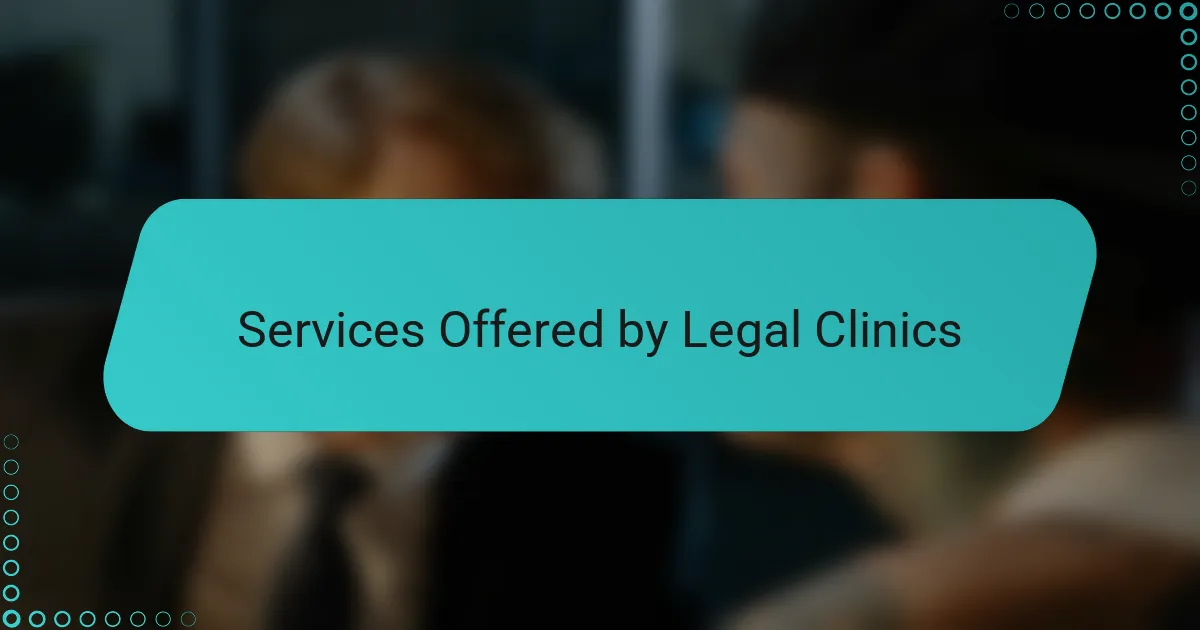
Services Offered by Legal Clinics
One of the first things I noticed about community legal clinics was the variety of services they offer. Whether you need help drafting a legal document, understanding a court procedure, or even resolving a landlord-tenant dispute, these clinics are equipped to assist. Isn’t it reassuring to find a place where so many different needs are met without having to navigate a maze of separate offices?
What really caught my attention, though, was their commitment to accessibility. Many clinics provide legal advice through appointments, walk-ins, or even phone consultations. I once called a clinic on a whim, feeling completely lost about a small claims matter, and was amazed at how quickly and patiently they walked me through my options—no fuss, just clear, practical help.
It’s also worth mentioning that community legal clinics often focus on educating clients about their rights. I remember sitting in a group workshop where the lawyer explained tenants’ rights in simple terms. That moment empowered me and others in the room—it wasn’t just about winning a case but understanding and standing up for ourselves in the long run. Have you ever experienced the confidence that comes from truly knowing your rights? That’s the kind of empowerment these clinics foster daily.
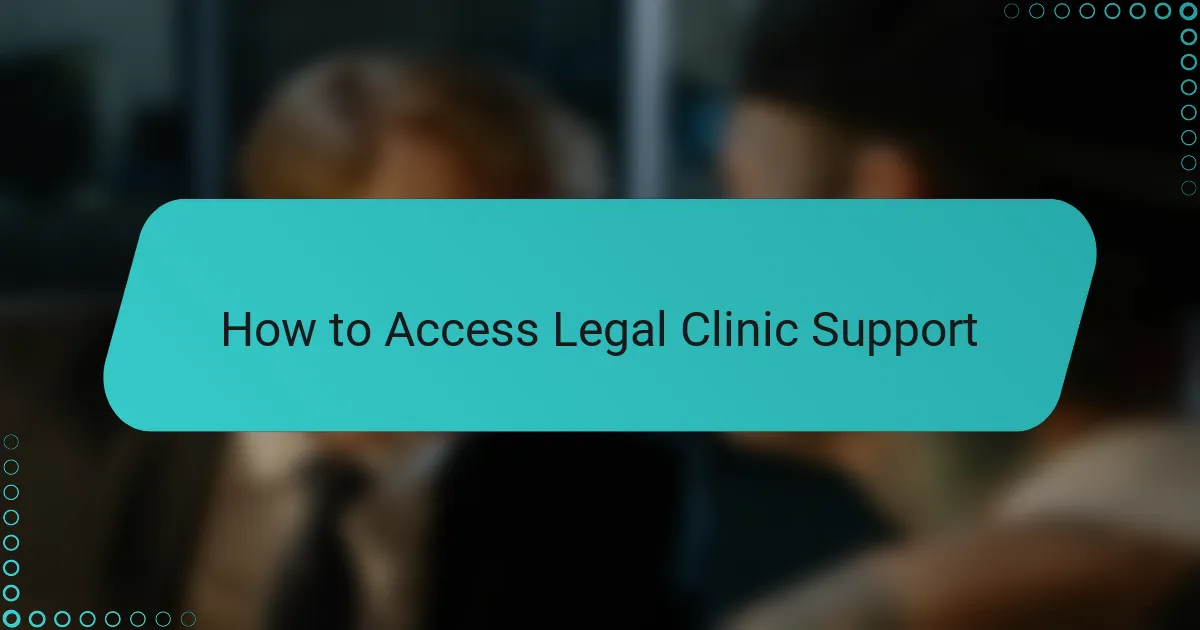
How to Access Legal Clinic Support
Finding your way to a community legal clinic is often easier than you think. From my experience, many clinics welcome walk-ins during certain hours, which means you can often just show up without an appointment and speak to someone right away. Have you ever walked into a place unsure of what to expect, only to be greeted with a friendly face ready to help? That was exactly my experience at my first clinic visit.
If you prefer planning ahead, most clinics allow you to schedule an appointment via phone or online. I recall feeling nervous about making that first call, but the person on the other end was patient and reassuring, guiding me through the simple steps to get the support I needed. Don’t underestimate the value of that initial conversation—it’s often the hardest part, but also the first big step forward.
Also, community legal clinics often share their contact details and service hours on local community boards, websites, or social media pages. I found it helpful to do a quick search using my location and the issue I was facing. Have you tried that little trick? It really demystifies access and puts assistance within reach, making the whole process feel less daunting.
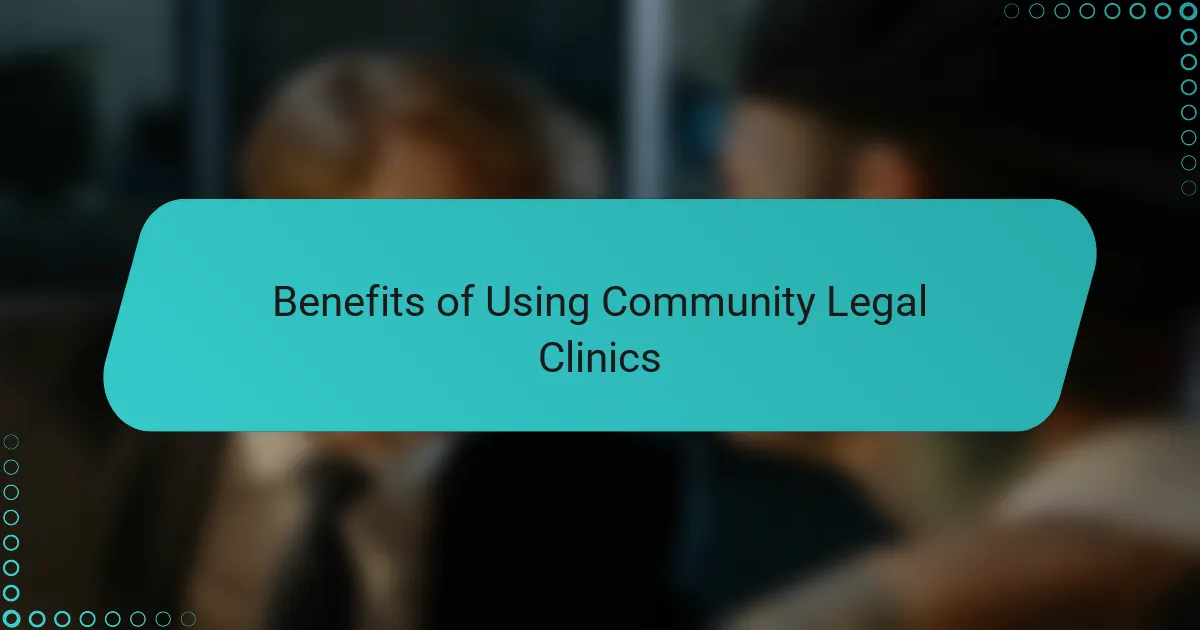
Benefits of Using Community Legal Clinics
One of the biggest benefits I found with community legal clinics is their affordability. When legal fees seemed overwhelming, these clinics offered an accessible option without the financial stress. Have you ever felt like expert legal help was simply out of reach? This was exactly the barrier community clinics helped me overcome.
Another advantage is the personalized support. I always felt heard and understood, not just treated like another case number. That personal touch made navigating the complex legal system feel less isolating. Isn’t it comforting when someone takes the time to truly listen to your story?
Lastly, the clinics’ focus on empowering clients made a lasting impact on me. Beyond just solving my immediate legal issue, they helped me understand my rights and how to advocate for myself moving forward. I walked away not just with answers, but with confidence—a benefit that goes far beyond any single appointment.
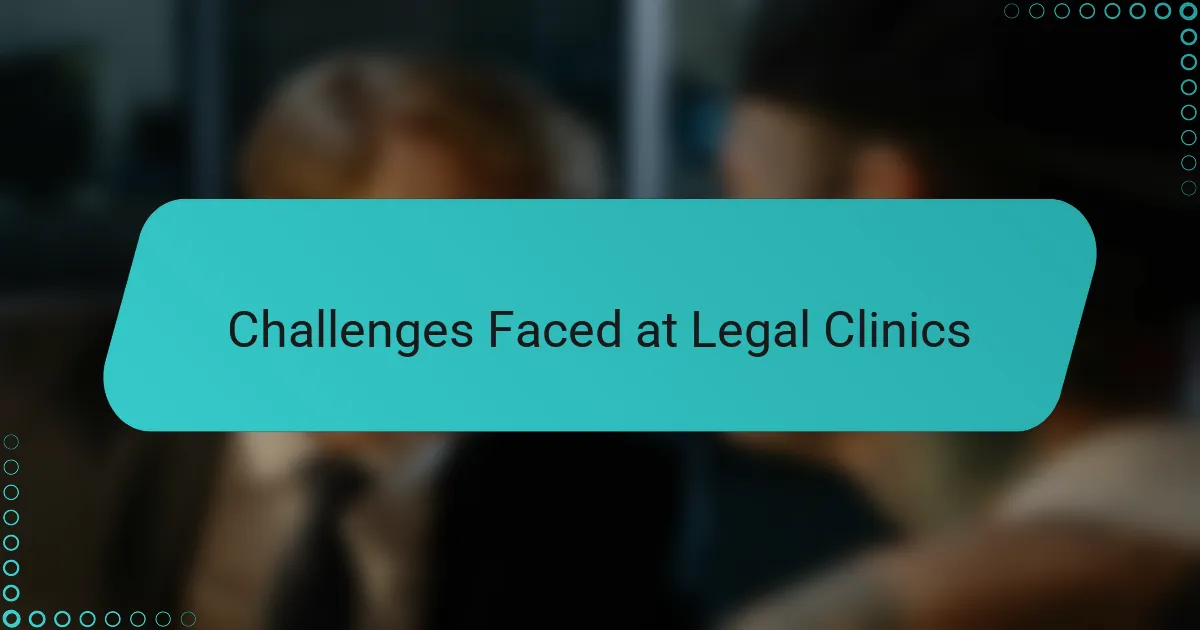
Challenges Faced at Legal Clinics
Sometimes, the biggest challenge I faced at legal clinics was simply the wait times. Clinics often work with limited staff and high demand, so even urgent cases could mean long waits before getting help. Have you ever sat in a crowded waiting room, anxious for answers but knowing you might have to wait hours? That tension can make an already stressful situation feel even more overwhelming.
Another hurdle was the complexity of the issues. While clinics do an amazing job breaking things down, some legal matters are deeply complicated and take multiple sessions to untangle. I remember feeling frustrated when I couldn’t get everything resolved in one visit; it reminded me that even the best clinics have limits in what they can handle in a single encounter.
Communication was sometimes tricky too. With busy schedules, follow-ups could be delayed, leaving me anxious about what was happening next. Have you ever felt like you were stuck in limbo, waiting for news that never seemed to come right away? It’s a normal part of the clinic experience, but it can test your patience and trust in the process.
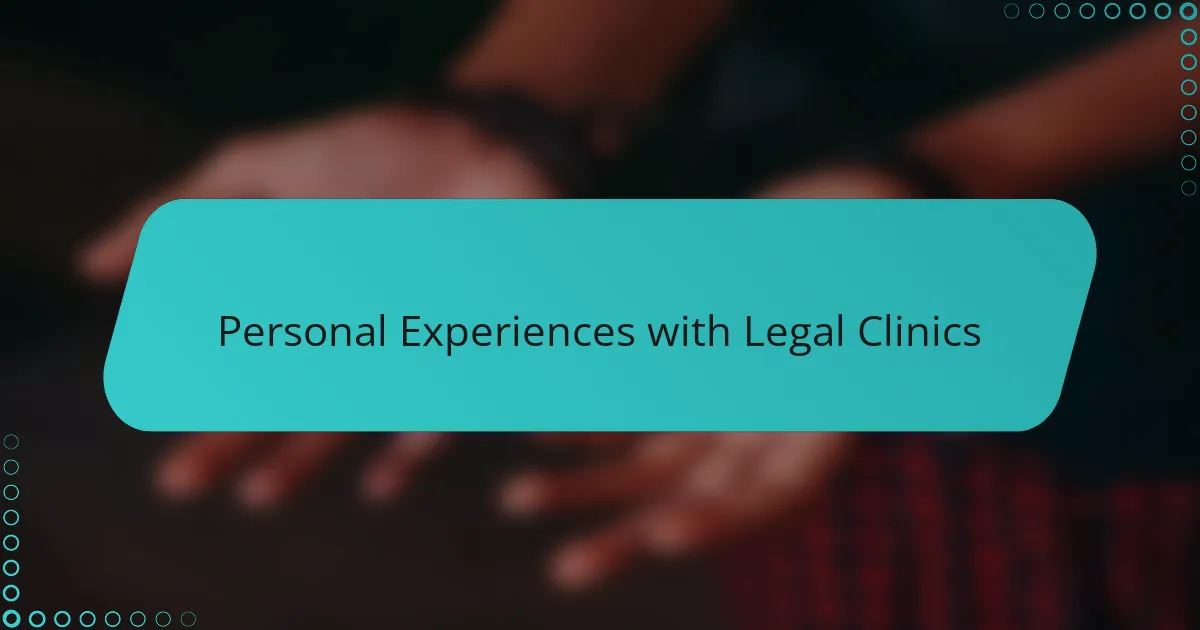
Personal Experiences with Legal Clinics
When I first walked into a community legal clinic, I wasn’t sure what to expect, but the warmth and patience I encountered immediately put me at ease. Have you ever felt like your problem was too small or confusing to deserve attention? The clinic’s staff made me feel like my concerns truly mattered, which was a relief and gave me a new sense of hope.
There was a particular moment when an advocate patiently explained my rights in a way I could actually understand. I remember sitting there nodding along, suddenly realizing the law wasn’t this distant, scary thing—it was something I could grasp and use to stand up for myself. That clarity changed not only my perspective on my case but also how I saw my ability to navigate legal challenges going forward.
Of course, not every experience was smooth sailing. At times, waiting for appointments or updates tested my patience, especially when anxiety was already high. Have you ever found yourself stuck between hope and uncertainty, unsure how long you’d have to wait for answers? Despite the delays, knowing there was someone committed to fighting for me made the wait feel worthwhile.
